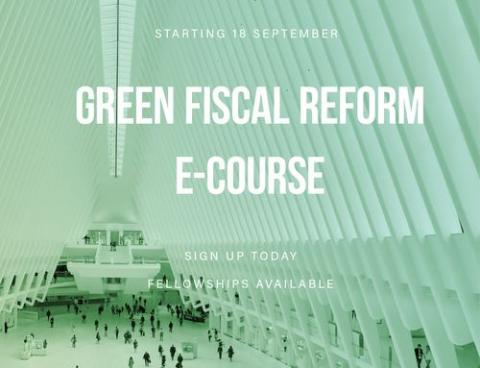
UNITAR Online Catalogue
Green Fiscal Reform

Partnership for Action on Green Economy (PAGE)
Antecedentes
Many governments face the triple challenge of reducing environmental risks, while fostering economic growth and reducing poverty. Green fiscal reform (GFR) as a policy approach can improve fiscal consolidation, spur innovation, and help identify smarter ways for government taxation and spending. By setting appropriate economic incentives and price signals green fiscal policies can help shift consumption patterns and drive private investments in human, natural, social and clean-produced capital.
To meet the learning needs and build capacities of national stakeholders, the Partnership for Action on Green Economy (PAGE) developed this e-learning course. The interactive and practice-oriented course seeks to provide interested participants from government, business, civil society and academia with an introduction to various approaches and policy instruments for reforming government spending and revenue generation with the goal of supporting the transition to a green economy.
More information can be found in the course flyer.
Objetivos del evento
The moderated course seeks to explain the basic concepts of GFR focusing on case studies and existing reform initiatives from around the world. It makes reference to technical guides and manuals suitable for participants working on/interested in the level of technical implementation of fiscal policies.
Objetivos del aprendizaje
After completing the course, participants will be able to:
- Define the concept of green fiscal reform and explain its value for a green transition
- Distinguish relevant policy instruments for correcting market failure and reforming economic incentives
- Discuss governance and policy processes, including associated risks and impacts, in relation to effective reform strategies
- Indicate key sectors with high potential for green fiscal reform
- Apply the green fiscal reform concept to a real-world context
Contenido y estructura
The course is composed of 5 modules, preceeded by 1 optional module. Each course module has specific learning objectives. The modules cover the following topics:
Preparatory Module: Excursion to Fiscal Policy and the National Budgeting Process
Module 1: Introduction to Green Fiscal Reform: Policy Context, Rationale and Related Concepts
Module 2: Fiscal Instruments for Greening the Economy
Module 3: Policy Design and Implementation of Fiscal Reform Strategies
Module 4: Applying Green Fiscal Reform in Key Sectors
Module 5: International Developments and Initiatives Supporting Green Fiscal Reform
The total number of learning hours is 40 over an 8 week period. During weeks 1-6 the study of learning journals is complemented by a range of learning activities and experiences such as interactive exercises and discussion fora. Weeks 7-8 are reserved for the development of an action plan and subsequent peer review.
Metodología
The course didactics are adapted for professionals engaged in full-time work. Participants are provided with the opportunity to learn through various experiences: absorb (read); do (activity); interact (socialize); and reflect (relate to one’s own reality).
To support this learning, the course features a number of learning activities and experiences that include exercises, discussion fora, and experiential learning. In support of the interactive elements of the course, essential background reading in form of Learning Journals is provided.
An applied case study (action plan) provides participants with the opportunity to apply GFR principles in a real-world situation. Participants will identify the problem context, relevant issues, define appropriate measures and develop an action plan for a self-chosen setting. Each case study is peer-reviews by two course participants, as well as the course moderator.
Público objetivo
The course targets groups and individuals who are interested in obtaining a solid understanding of green fiscal reform and relevant policy instruments to implement it. The target group includes:
- Civil servants in national and sub-national departments and agencies, e.g. ministries of finance, economic development, environment, energy and/or environmental protection agencies, as well as public service providers
- Development partners in international cooperation
- Staff of civil society organizations and private associations
- Sector specialists in energy, forestry, fisheries etc.
- Faculty, researchers and students
Información adicional
A limited number of fellowships are available for eligible candidates.
To learn more about eligibility criteria and the application procedure, click this link.
For further information, contact page [at] unitar.org